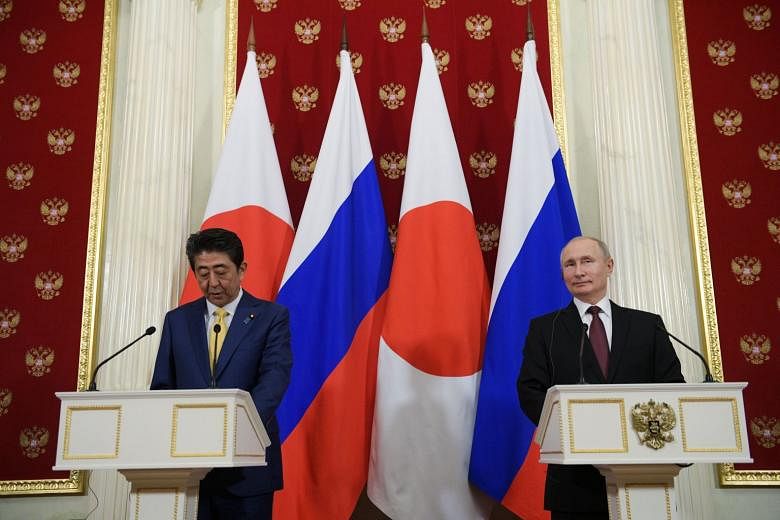MOSCOW (BLOOMBERG) - Russian President Vladimir Putin and Japanese Prime Minister Shinzo Abe ended their latest attempt to resolve a territorial dispute over four islands with a pledge to keep talking, even as the Kremlin damped expectations for a breakthrough.
While discussions were frank and informative, there is "painstaking work ahead" and any deal must be acceptable to both the Russian and Japanese people, Putin told reporters after the Kremlin talks with Abe on Tuesday.
"We discussed a peace agreement without hiding anything from each other," and the two countries' foreign ministers will continue talks next month in Munich, Abe said.
The 25th meeting between the two leaders since 2012 offered little visible evidence of progress over the islands, known as the South Kurils in Russia and the Northern Territories in Japan.
"It's necessary to strengthen the atmosphere of mutual trust," Kremlin spokesman Dmitry Peskov told reporters after the talks. "The best way to do this is to develop trade and economic cooperation in all possible areas."
Russian Foreign Minister Sergei Lavrov said last week that "significant differences" remain, and that Japan must first recognise Russian sovereignty over the islands as part of the outcome of World War II before there can be progress on other issues.
The Soviet Union seized the windswept Pacific islands in 1945, expelling all 17,000 Japanese residents, and the territorial dispute has prevented the two sides from signing a peace treaty.
Putin said he and Abe reaffirmed their agreement in Singapore in November to accelerate efforts to resolve the dispute, based on a 1956 declaration under which the Soviet Union offered to return two islands after the conclusion of a peace treaty.
Abe said then that the issue "will be solved by Putin and me, and not left for the next generation."
IMPROVE TIES
Settling the dispute would enable Japan to improve ties with one of its largest energy suppliers and help it counterbalance the growing power of China, which Putin has courted.
Russia is seeking more Japanese investment and to reduce the impact of US and European Union sanctions over the Ukrainian conflict.
Police detained several demonstrators outside the Japanese embassy in Moscow before the talks began, including some who held up placards denouncing any concessions to Japan, according to the state-run Tass news service.
A nationalist deputy in the lower house of Russia's parliament submitted a bill Tuesday to declare Sept 2 "Japanese surrender day" to mark its capitulation in 1945, the RIA Novosti news service reported.
Abe, whose father also battled for a resolution of the dispute, has pushed to conclude a deal during his premiership, while Putin has been much more cautious.
"Negotiations are only at the initial stage," Peskov told reporters on Monday.
Abe is running out of time and nobody else in Japan will try to resolve the issue if he cannot succeed, while Putin is under no such pressure, former Russian Deputy Foreign Minister Alexander Panov said Monday.
"It is clear now that there will be long, protracted negotiations on the peace treaty and who knows when we will be able to get to resolving the territorial dispute," said Panov, a former Russian ambassador to Japan.

